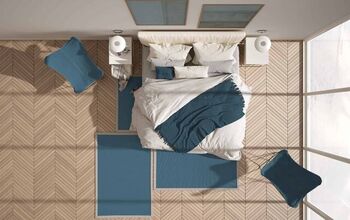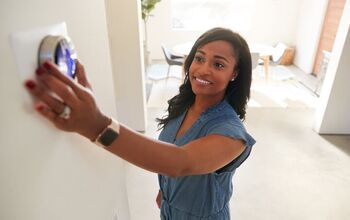Bedroom Gets Hot When Door Is Closed? (Do This!)

One of the most frustrating things about warmer weather is a hot bedroom. Why is it that our bedrooms seem to stay hot with the door shut while the rest of the house stays cooler?
The bedroom gets hot when the door is closed because of inadequate insulation and airflow. Check that the air vents are working correctly and there are no air duct issues. Next, replacing old windows with low emissivity glass will help keep the room cool, especially during summer. There’s the option of purchasing an AC window unit as well.
If you can’t sleep with the door open, but your room gets hot with the door closed, keep on reading. We have several remedies to help keep your room nice and comfortable.
Why Is One Room Hotter Than The Rest?
Those who have a room in their house that is notoriously warmer than the rest, such as their bedroom, know-how aggravating (not to mention uncomfortable) this can be.
While various factors affect how much or little air reaches a room, inadequate insulation and airflow throughout your home are the most common.
How Can I Increase Airflow in My Room?
The most basic and obvious thing you can do to improve air circulation in your indoor spaces is to open the windows. You can generate a cross-flow by simply opening the windows of different rooms in your house, which will help to improve the circulation of your entire home.
Consider opening one or two windows for at least 15 minutes twice a day while it’s cooler outside. This will significantly improve air circulation in your home. You can also open your bedroom door to allow the air to flow even further and fully exchange the heat with a cooler temperature.
Why is the Bedroom So Hot When the Door is Closed?
There are a variety of reasons why one area in your house is so hot in comparison to the rest of your home. Here are a few of the most typical reasons for this:
Inefficient Windows
If you live in an older home, your windows may be inefficient, allowing heat to enter particular areas of the house.
When double-pane windows are replaced with Low-E glass windows, the ultraviolet and infrared light that goes through the glass is reduced, resulting in less heat gain when the sun shines through.
However, window replacement isn’t cheap, so if you’re not ready to make the leap, consider window film or window tint instead.
Windows are in Direct Sunlight
We all enjoy the way natural light enhances the appearance of our houses, but with natural light comes heat gain. It might be challenging to keep your home cool if your windows receive direct sunshine.
You have a few alternatives if this is an issue in your home. Planting trees near windows can act as a natural (and attractive) barrier between the sun and your house. If it isn’t possible, consider using awnings or blackout curtains.
Air Duct Issues
It’s possible that a problem with your home’s ductwork will prevent airflow from reaching particular areas. Improper airflow and temperature discrepancies can be caused by crushed or damaged ductwork. Unconnected ducting, uninsulated ductwork or air duct leaks may also be the issue.
Insufficient Return Air Vents
If the same room is consistently too hot or cold, and the air filter appears to be about to be pulled into the return air vent opening, your system is most likely lacking in the air intake.
Use a filter with a lower MERV rating, as this will enable more air to pass through. If it doesn’t work, you might need to install a second return air vent in the room.
Closed Air Vents
Make sure your air vents are open and not blocked by neighboring furniture or decor in each room of your house. When air vents are closed, they not only obstruct airflow in the space they are in, but they can also produce a duct system imbalance, causing your bedroom to get too hot.
Poor Home Insulation
Insufficient or uneven insulation may be the cause of your home’s inability to retain cold air in the summer. This is particularly true in older homes.
Because of the lack of insulation, no matter how hard your air conditioner works, the cool air escapes, and the heat always finds its way back inside.
Electronics
Computers generate a lot of heat, especially those with high-end graphics cards. Monitors, televisions, lights, lamps, LED clocks, and other electrical devices also emit heat.
One option is to switch these devices off while they are not in use. If you haven’t already, switch to LED light bulbs for lamps and other illumination.
Home Additions
Is there a room that was built onto your house? Have you recently completed a major remodeling of your home? Your air conditioning system was custom-fit to your home’s size and layout when it was installed.
If you added a room to your house without installing additional ductwork, the space may not be getting enough (or any) airflow to keep it cool or warm.
Adding a window unit or purchasing a box fan can help in some circumstances. If you’ve added a lot of space, it’s a good idea to see a skilled HVAC specialist about the best options.
Clogged Air Filter
When was the last time you had your air filter replaced? One of the most critical components of your air conditioning system is the air filter. If you don’t have it, your system will circulate dirt, dust, and other debris throughout your home (gross, right?).
However, just like the air filter in your car, the air filter in your air conditioning system needs to be updated on a regular basis. When the air filter becomes excessively clogged, it obstructs airflow. This might result in a shortage of cool air reaching some areas of your home, resulting in uncomfortable temperature fluctuations.
Oversized AC System
Bigger isn’t always better when it comes to air conditioning systems. If your air conditioner is too large for your home, it will cool it down too quickly.
Your air conditioner does more than just chill your house; it also dehumidifies it. As a result, when your air conditioner runs on short, fast cycles, the air in your home cools quickly. However, your space will remain humid since your air conditioner won’t have enough time to remove the moisture before the cycle ends. You could notice that some rooms are more affected than others.
It can be challenging to know how to deal with an enormous air conditioning system. A dehumidifier may be all that is required in some circumstances to help your home achieve the optimum degree of comfort.
If your energy expenses are excessively high, however, it may be more cost-effective to replace your system with an air conditioner that is more appropriate for the size of your home.
Does Air Circulate Better With the Door Opened or Closed?
It’s best to keep your interior doors open as much as possible to allow air to circulate freely from room to room. This will prevent house pressure issues and make it easier for your air conditioner to cool your home evenly and efficiently.
Consider keeping your bedroom door open a crack and leaving it open throughout the day if you close it for privacy when you sleep at night.
How Can I Keep My Bedroom Cool When the Door is Shut?
It’s difficult for us to cope with the heat. It makes working difficult, reduces productivity, and even sleep does not provide respite.
What are the most effective strategies to combat the heat and cool a tiny space? Let’s look at several tried-and-true methods for cooling a room without air conditioning.
Put Ice In Front of a Fan
One useful idea is to place ice or cold water in front of the fan while it is running. As a result, the fan will circulate the coldness of the water or ice, making your room cooler. When doing this, it’s better to close the door and windows to keep the air inside.
The theory is that the ice generates cold air around it, which is then blown around by the fan. This is an excellent substitute for air conditioning. Don’t sit straight in front of the stream as this could irritate your eyes.
Adjust Your Ceiling Fan (If You Have One)
You can also adjust your ceiling fan’s settings according to the season. Did you know that ceiling fans can operate in two modes? The blades may either create wind or force warm air down depending on how they revolve (hot air always travels up).
In the summer, you may use it to produce a breeze, and in the winter, you can use it to force warm air down. During the summer, it should spin counterclockwise, and it should spin clockwise during the winter. Make sure you’ve got the appropriate setting, so you’re cooling rather than warming a room.
Sleep Low to the Floor
The air near your floor is cooler than the air above the ceiling due to the warm air rising. If you don’t mind sleeping on hard surfaces, you can disassemble your bed and place the mattress on the floor. Or you can also try sleeping without a mattress for a night to see if it makes a difference.
If your floor is built of tiles, you can also sleep on the floor during warm days. This is an excellent method to stay cool in the summer. The tiles are usually chilly and will make sleeping more comfortable. Get a thin rollout mat for additional cushion if the floor is too hard.
Open the Windows at Night
Nothing beats the natural and refreshing feel of the night air. You can take advantage of the cooler night air by opening one or more windows or doors. If it’s raining, open the windows just enough to let the cool air in while keeping the rain out. During the rainy season, the air will make your room colder.
As soon as the temperature outside decreases, open your window. In fact, open all of the windows in your house at night to cool it down and allow for a cross breeze, then close them the following day when the air warms up again.
Buy Cooling Bed Accessories
Innovative mattress technology has been created to aid in keeping you cool while sleeping. Cooling mattresses come in a variety of styles, from moisture-wicking coverings to permeable foam cores. These were created to help you get through the summer nights sweat-free.
You can also opt for cooling sheets and pillows in addition to mattresses for a more relaxing experience. Even if you’re not in bed, you can use the sheets to keep cool while sitting on the couch.
If you can’t afford cooling mattresses, pillows, or sheets, you can cover your bed with cotton sheets and avoid using anything else. Cotton breathes better than other materials; thus, it will keep you cooler at night.
Take a Hot Shower
Taking hot showers on a hot day sounds like it defeats the purpose, but it will help your body adjust to the hot temperature. You will feel too hot in the shower, so when you step out, the weather will feel cooler. If you don’t want to use the hot shower method, a lukewarm shower to cool down your body can work just as good.
However, having a cold shower should be avoided after being in a hot area or with a high temperature. If you want a cold shower instead of a hot or lukewarm one, cool yourself in front of a fan with a cool rag before hopping in the cold shower. This will help avoid shock.
Cool Off Your Pulse Points
If you’re particularly overheated, apply an ice pack or a cool, wet towel to your pulse points, which include your wrists, ankles, elbow crooks, and the backs of your knees. Simply wrap a towel around your body to keep it from getting too cold.
You may immediately lower your body temperature and feel cooler by applying something cold to your pulse points. Although this is an old practice, it is still quite effective.
Cooling Down the Bedroom
Because you feel the hottest when you’re sleeping, the majority of the suggestions above are best used at night. So, before you go to bed, try out a few of these.
We can all agree that these tricks have both advantages and disadvantages. On the one hand, spraying a sheet with water and using it to cool down is a relatively inexpensive option. However, most of them will not work for an extended period of time.

Heather is a passionate writer who loves anything DIY. Growing up, she learned everything from home repairs to design, and wants to share her tips with you. When she's not writing, she's usually hiking or searching for her next DIY project.
More by Heather Robbins



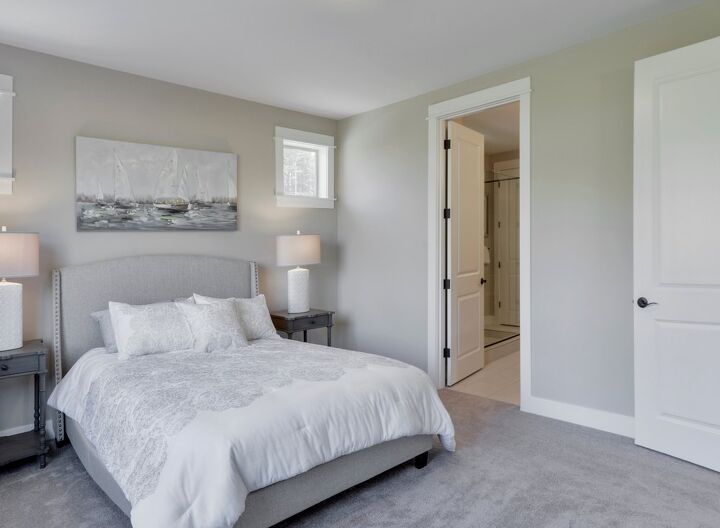


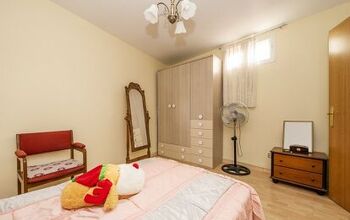





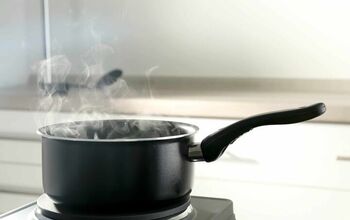

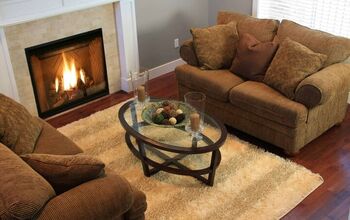
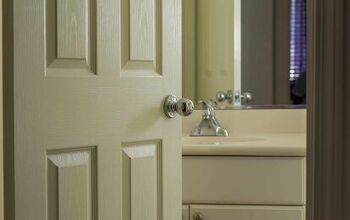

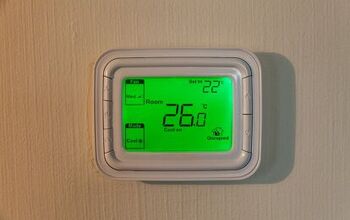

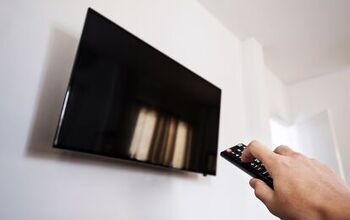


![12 Washing Machine Brands to Avoid [with Recall Data]](https://cdn-fastly.upgradedhome.com/media/2023/07/31/9075781/12-washing-machine-brands-to-avoid-with-recall-data.jpg?size=350x220)
